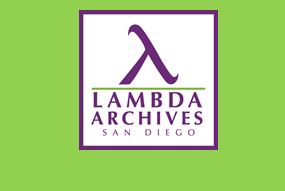 After a months’ long search, Ken Selnick has joined the staff of Lambda Archives of San Diego as their new digitization archivist.
After a months’ long search, Ken Selnick has joined the staff of Lambda Archives of San Diego as their new digitization archivist.
Selnick is a part-time librarian at the National City Public Library. He has Bachelors in History from San Diego State and a Masters of Library Science with an archival concentration from Simmons College in Boston. While at the Cambridge (Massachusetts) Historical Society, he oversaw the digitization of 44 volumes—over 6000 pages—of their scholarly journal. It is now available on line and fully searchable to be accessible to researchers. He has also worked for the National Archives and Records Administration where he digitized maps and photos for the U.S. Department of Defense. He was responsible for processing the papers of Professor James Green of U. Mass-Boston who created the first labor studies department in Massachusetts. Ken is married and has two children.
“The mission of Lambda Archives coincides with my own desire to collect, preserve and make available material of enduring value that reveals the lesser known histories that would otherwise be lost,” Selnick said. “These are stories worth telling, that need to be told in order to set the record straight, to highlight the struggle, suffering and triumphs of so many for so long, to ensure accountability and to credit those who were responsible or influential in the movement toward equality and acceptance as well as those who stood in the way.”
“We’re thrilled that we now have a digital specialist to support the generous grant we have from California Institute of Contemporary Arts,” said Maureen Steiner, president of Lambda Archives. “With Ken’s extensive experience in digitization, we are confident he’ll do a great job overseeing the scanning of our large collection of photos and documents.”
With the help of a couple of stellar volunteers, Selnick has already readied our upstairs room and begun using that space for storing our growing holdings. Being Alive and Auntie Helen’s both recently entrusted the Archives with some of their memorabilia. The new owners of Bourbon Street also had hundreds of photos among the boxes of memorabilia which they donated. Eventually those pictures will also be digitized.
Selnick added, “We cannot preserve everything, but when a donor indicates that it’s us or the trash, then it seems irresponsible for us to let it slip away not knowing if we disposed of a pearl among the shells. The challenge, along with the satisfaction comes from the creation of order out of disorder and so at first the particular collection is a puzzle needing to be pieced together. The sifting and organizing of the material leads to the uncovering of the story and often uncovers a deeper and more complex history. The ultimate goal is to then make the story easily accessible to anyone who is interested and to make sure it is available to future generations.”
Selnick also has years of bartending and waiting experience which came in handy recently when he volunteered to pour wine at the Out at the Archives event on April 27.
The Archives already has over 200,000 photos, only about 8000 of which have been scanned so far, so Selnick and his team will have their work cut out for them.











